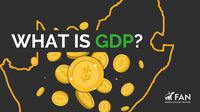
Whenever politicians or economists talk about the economy, it often sounds like 'warra-warra' waffle. To make economic policy something YOU can use to fight for freedom, let's un-warra-warra a key economic term: GDP.
Watch here:
Transcript
Whenever politicians or economists talk about the economy, it often sounds like ‘warra-warra’ waffle.
To make economic policy something YOU can use to fight for freedom, let’s un-warra-warra a key economic term: GDP.
GDP or ‘gross domestic product’ is the total sum of money that would be needed to buy every finished product and every available service in a country in one year.
High GDP growth means an economy doing well – people and businesses producing lots of products and services. Low GDP growth is the opposite.
People living in countries with healthy economies and high GDP growth are healthier, happier and better-educated.
In South Africa, high levels of GDP growth were achieved between 1994 and 2007 – improving lives across all racial groups:
During this period, the government did not max out its credit card - falling into debt - and had a relatively free economy, where people had the freedom to trade without too much government interference.The country also benefited from a ‘global commodity boom’ – people wanted to buy what we were selling!
But, since the financial crisis of 2007/8, South Africa’s economy has fared poorly.
Freedom to trade has suffered due to the government interfering with onerous and expensive laws and regulations. To implement them, government has become bigger, costing the taxpayer more:
The first step in fighting for freedom is using knowledge to challenge those in power. The next time a politician promises you better life, ask them:
“How will your policies make it easier for ordinary people to trade and make life better by boosting our GDP?”
Your freedom is worth fighting for. Join FAN today to build a new tomorrow.
Illustration sources available here.
